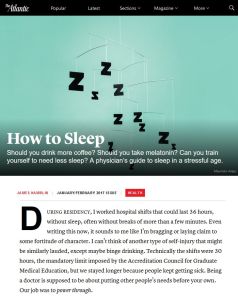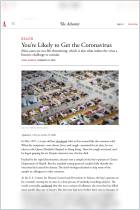
James Hamblin
How to Sleep
Should you drink more coffee? Should you take melatonin? Can you train yourself to need less sleep? A physician’s guide to sleep in a stressful age.
The Atlantic, 2017
What's inside?
Lack of sleep is not just an inconvenience, but a condition with potentially serious consequences.
Recommendation
Not getting enough sleep can have serious consequences, but people’s lifestyles often show a worrying disregard for the human body’s natural wake/sleep patterns. In this informative and entertaining article, health media guru and senior editor at The Atlantic James Hamblin, MD, looks at people’s paradoxical relationship to sleep and explains the physical and mental effects of their attempts to meddle with their body’s natural rhythms. getAbstract recommends this article to anyone looking to understand what happens to the brain and body when sleep proves elusive.
Take-Aways
- People with sleep deprivation show similar symptoms to someone who is drunk.
- The average adult needs between seven to nine hours of sleep in a 24-hour cycle to function at their optimum ability.
- Consuming caffeine causes the body to release the hormone adrenalin, putting it in “fight-or-flight” mode.
- Research shows that screen light can seriously affect the human sleep cycle.
- Besides taking melatonin supplements, there are several healthier and safer alternatives to promote a good night’s sleep.
Summary
People with sleep deprivation show similar symptoms to someone who is drunk.
If a person does not get enough sleep for a prolonged period of time, they run the risk of serious health problems. Not sleeping enough also has similar effects to drinking too much alcohol: it causes a significant drop in cognitive skills as well as a loss of self-awareness. This means that people who are overtired still think that they are able to perform at their usual level.
The average adult needs between seven to nine hours of sleep in a 24-hour cycle to function at their optimum ability.
Studies have found that most adults need between seven to nine hours of sleep to perform at their best. Only about one per cent of the population can live on four or five hours of sleep without problems. Even slight sleep deprivation (i.e. allowing people only six hours of sleep) can cause a noticeable drop in performance on cognitive tests.
Consuming caffeine causes the body to release the hormone adrenalin, putting it in “fight-or-flight” mode.
Caffeine triggers the release of adrenalin in people’s blood, causing something akin to the “flight and fight” response. It interferes with adenosine, a chemical that keeps people’s neural activity in a restful state. Too much intake of caffeine can cause the body to be in a constant state of “high alert,” which then negatively impacts sleep and energy cycles.
Research shows that screen light can seriously affect the human sleep cycle.
Experts are concerned that using tablet computers and mobile devices at night time negatively affects people’s health because it interferes with the natural process of falling asleep. Light directly stimulates the hypothalamus, the part of the brain that controls the sleep cycle. At night, when light gets dimmer, the hypothalamus causes the hormone melatonin to be released into the blood, signaling to the body that it is time to sleep. In the morning, this process stops, causing the body to wake up.
Besides taking melatonin supplements, there are several healthier and safer alternatives to promote a good night’s sleep.
Melatonin supplements, which can be bought without a prescription in the United States, are becoming a popular means of helping people to sleep. So far, very little is known about the long-term effects of using these supplements and whether they actually improve the quality or length of sleep. Much healthier and safer alternatives include reducing caffeine intake, keeping away from lit screens before going to bed and sticking to roughly the same time for going to bed and getting up in the morning each day.
About the Author
James Hamblin, MD, is a writer and senior editor at The Atlantic and hosts a video series entitled If Our Bodies Could Talk. He is considered one of the most influential people in health media.
This document is restricted to personal use only.
My Highlights
Did you like this summary?
Read the articleThis summary has been shared with you by getAbstract.
We find, rate and summarize relevant knowledge to help people make better decisions in business and in their private lives.
Already a customer? Log in here.

















Comment on this summary